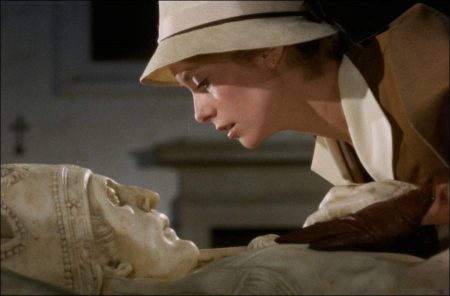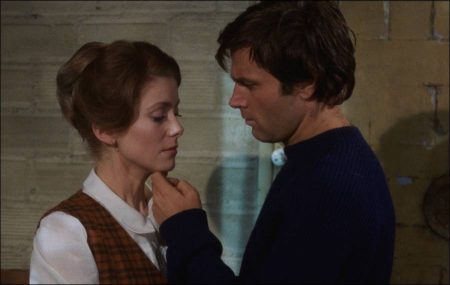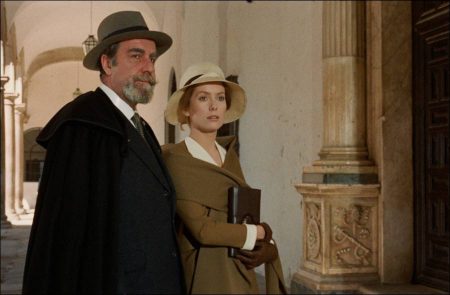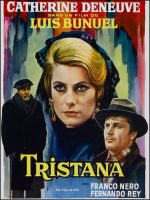
Tristana movie storyline. In the 30’s, in Spain, the teenager Tristana becomes an orphan when her mother, who is the servant of Don Lope (Fernando Rey), dies. Don Lope is a decadent but respected aristocrat, anticlerical and liberal with socialist principles, and he becomes the guardian of Tristana. Don Lope sexually abuses of Tristana and develops a strange lover/father relationship with her.
When Tristana meets the painter Horacio, they fall in love with each other and Tristana flees from Don Lope. However, years later, Horacio brings Tristana back to Don Lope with a terminal disease on her leg. She has a severed leg and survives, and Don Lope asks her hand in marriage. She accepts but now Tristana is a bitter and cynical woman and Don Lope feels the consequence of his acts in the past.
Tristana is a 1970 drama film directed by Luis Buñuel, based on the 1892 novel of the same name by Benito Pérez Galdós. The film stars Catherine Deneuve and Fernando Rey and was shot in Toledo, Spain. The voices of French actress Catherine Deneuve and Italian actor Franco Nero were dubbed to Spanish. Tristana is an international co-production between Spain, France and Italy. It was nominated for the Academy Award for Best Foreign Language Film and screened out of the main competition at the 1970 Cannes Film Festival.
About the Production
Buñuel first began working on Tristana in 1962 after Spanish censors rejected his script Secuestro. Buñuel suggested adapting Benito Pérez Galdós’s novel instead to his producers at Epoca and was paid $30,000 to write the screenplay. Buñuel and Julio Alejandro wrote the script in December 1962 and updated the novel’s setting to the period between the late 1920s to early 1930s. Buñuel and Epoca submitted their script to the Spanish censors in the spring of 1963, hoping to begin shooting in the summer. At the last minute, the Ministry of Culture rejected the script because of its depiction of duelling and Buñuel made Diary of a Chambermaid instead.
In December 1968, Buñuel decided to return to Spain after being allowed back into the Catholic Church. When he returned, producers from Epoca approached him about reviving Tristana. Buñuel was initially uninterested and wanted to instead film his script for The Monk, which would have starred Jeanne Moreau, Peter O’Toole and Omar Sharif. But producers at Epoca managed to find funding from Italian and French investors and secure the newly built Siena Studios in Madrid, convincing Buñuel to agree to the project. Buñuel and Alejandro quickly finished their fourth draft of the screenplay.
Buñuel wanted Tristana to be his triumphant return to Spain after living in Mexico for several decades and worked hard on the film. Buñuel travelled to Spain in the spring of 1969 to begin work on the film, and was immediately sidetracked by the Spanish censors. Spain’s Franco government made it difficult for the notorious and outspoken atheist Buñuel to get his films approved.
However, Minister of Information Manuel Fraga Iribarne was known to be more liberal than past Ministers and told Buñuel that he would approve the script only if Buñuel promised to not change the script during the film’s shooting. Buñuel refused, stating that the script was merely a blueprint. Eventually Buñuel got his and Fraga’s mutual friend Rafael Mendez to act as a go-between and convince Fraga to approve the script.
Buñuel’s French investors insisted that Catherine Deneuve be cast as Tristana and his Italian investors wanted young heartthrob Franco Nero to play Horacio. Filming began in September 1969. Actress Vanessa Redgrave was often on the film’s set after recently divorcing Tony Richardson for Nero, which caused Nero to often be late or distracted during filming.
The film’s plot has many similarities to Buñuel’s earlier film Viridiana and the character of Don Lope is partially based on Buñuel’s father, who was also a “señorito (an adult who never worked a day in his life but lives comfortably, or even luxuriously, thanks to an inheritance). Buñuel based much of Tristana’s schoolgirl innocence on memories of his younger sister Conchita.
Tristana (1970)
Directed by: Luis Buñuel
Starring: Catherine Deneuve, Fernando Rey, Franco Nero, Lola Gaos, Antonio Casas, Jesús Fernández, Vicente Soler, José Calvo, Fernando Cebrián, Antonio Ferrandis, Cándida Losada, José María Caffarel
Screenplay by: Luis Buñuel, Julio Alejandro
Production Design by: Enrique Alarcón
Cinematography by: José F. Aguayo
Film Editing by: Pedro del Rey
Costume Design by: Luis Argüello, Rosa García
Set Decoration by: Luis Argüello, Rafael Borqué
MPAA Rating: None.
Distributed by: Mercurio Films S.A. (Spain), Valoria Films (France), Dear Film (Italy)
Release Date: March 29, 1970 (Spain), April 20, 1970 (France), August 27, 1970 (Italy)
Views: 303










